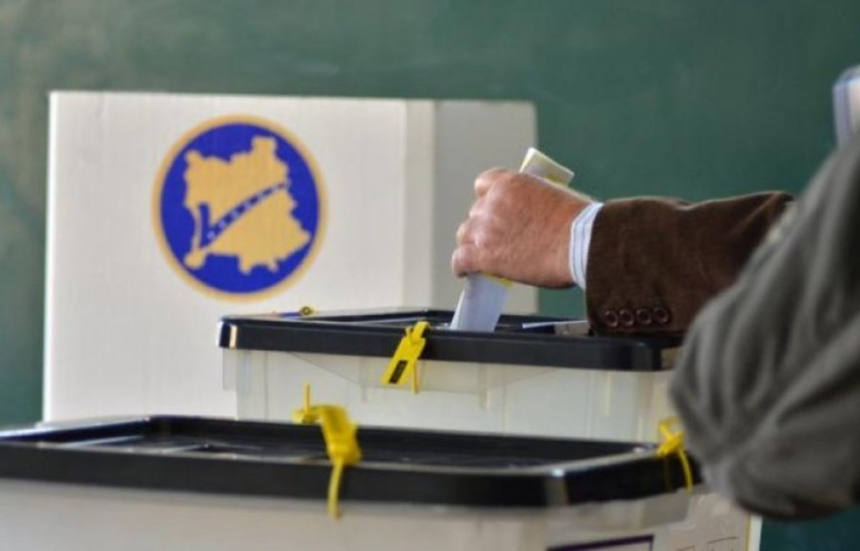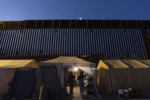The state of Serbia is actively engaged in organizing voting for displaced persons from Kosovo in the upcoming parliamentary elections in Kosovo, scheduled for February 9.
The process involves the Commissariat for Refugees and Migration, a state-run organization in Serbia.
On January 17, the Commissariat urged displaced persons from Kosovo in Serbia to vote in the elections and announced that transportation to the polling stations would be organized for all interested parties.
Meanwhile, on January 21, the ruling Serbian Progressive Party (SNS) publicly supported the Serbian List in the upcoming Kosovo elections and called for people to vote for it.
By choosing this party, the protection of the Serbian population in Kosovo will be ensured, said Serbian Prime Minister and SNS leader, Miloš Vučević.
Displaced persons from Kosovo hold different views on the issue of voting and supporting the Serbian List, while other Serbian political options in Kosovo are urging them to “think about those who live in Kosovo.”
“We will comply with the state”
Dragisha Stanojević from Prizren, who has been displaced in Belgrade since 1999, plans to respond to the call of the Commissariat for Refugees of the Republic of Serbia and vote in the Kosovo parliamentary elections on February 9.
His motivation, as he says, is “to improve the rights of Serbs in Kosovo” and ensure “their stay and survival” – an appeal also made by the Commissariat for Refugees.
Speaking to Radio Free Europe, Stanojević says he is guided by the official policy of Belgrade, which exclusively supports the Serbian List.
This party is the largest Serbian political group in Kosovo and was formed with the support of official Belgrade, specifically SNS.
Stanojević says he will comply with the call of the Serbian Prime Minister, although he emphasizes that “no one has suggested to him who to vote for.”
“I believe that the Serbian List currently gathers the best people, that the majority of Serbs down there [in Kosovo] stand behind it, and naturally, the state of Serbia stands behind it,” says Stanojević.
Since November 2022, the Serbian List’s deputies have not actively participated in the Kosovo Assembly, due to what they have described as a “boycott policy.”
At that time, Serbian representatives decided to withdraw from Kosovo’s institutions in the north, opposing the Kosovo government’s decision to replace Serbian license plates with Kosovar ones.
To avoid losing their mandates and salaries, Serbian deputies have attended the Assembly every six months just to sign in.
“Displaced persons should think about those living in Kosovo”
In addition to the Serbian List, five other political entities representing the Serbian community are competing for the ten guaranteed seats for Serbs in the Kosovo Assembly: Serbian Democracy, People’s Justice Civic Initiative, For Freedom, Justice and Survival, Party of Kosovo Serbs, and the Serbian People’s Movement.
Branimir Stojanović from the Serbian People’s Movement says that SNS will use all its resources to send people to Kosovo who will support the Serbian List in the February 9 elections.
He states that displaced Serbs from Kosovo should certainly exercise their right to vote but adds that “they should carefully think about those living in Kosovo.”
“It’s about our lives and those who should speak on our behalf,” says Stojanović.
Members of the Serbian community living in Kosovo, with whom Radio Free Europe spoke on January 14, stated that their vote will go to the party that can ensure peace, security, equal employment, and institutional efforts to realize their rights.
According to the United Nations High Commissioner for Refugees (UNHCR), around 200,000 people were displaced from Kosovo to Serbia between 1999 and 2004.
Stojanović hopes that those who decide to vote in Kosovo’s elections will think carefully about who they vote for because, as he says, “a number of people left Kosovo in recent years precisely because of the policies of the Serbian List.”
He sees SNS’s public support for the Serbian List as a “continuation of old practices” and says that this party “has taken political responsibility for all the decisions of the Serbian List.”
For Aleksandar Arsenijević, leader of Serbian Democracy, SNS’s support for the Serbian List is not surprising.
“Completely expected. Official Belgrade still doesn’t realize that the Serbian List is a threat to them just as much as it is to us,” says Arsenijević to Radio Free Europe.
Organized transport, lunch, and refreshments
Dragica Gjorgjević, an activist from the informal group “Support for Women Displaced from Kosovo,” who currently lives in Aranđelovac, Serbia, has not yet decided whether she will vote in Kosovo’s elections on February 9.
She says that Serbs from Kosovo, who live as displaced persons in Serbia, have been “completely forgotten,” and adds that most of her compatriots believe that the upcoming elections will not change anything regarding the position of Serbs in Kosovo.
“Therefore, based on what I know and hear, most of our people are closer to the option of not voting, despite the fact that transport will be organized from several cities in Serbia and that people who choose to go to the polling stations will have packed lunch and refreshments,” says Gjorgjević.
Some displaced persons from Kosovo in Kragujevac, Serbia, who were interviewed by Radio Free Europe’s team but wish to remain anonymous, say they will not respond to Belgrade’s call to participate in the elections in Kosovo because “there are no conditions for such a thing.”
“Nothing good can be expected from these elections,” is one of the responses from displaced Serbs in Kragujevac – a city in central Serbia.
How informed are displaced Serbs about the situation in Kosovo?
Dragisha Stanojević, who has been living in Belgrade as a displaced person since 1999, believes he is well-informed about events in Kosovo, from which, as he says, he mostly learns through the media in Serbia.
“I know that the current situation is very complicated. I know that the Albanian authorities are terrorizing Serbs and Serbian institutions that have remained there. At the same time, they are systematically working to expel Serbs from Kosovo,” he says.
Senior officials from the Serbian List constantly talk about “terror” and “persecution” by Kosovo authorities, led by Prime Minister Albin Kurti.
“Everything Kurti has done, he has done to destroy the Serbian List and the Serbian people,” Serbian President Aleksandar Vučić said to Radio Television of Serbia on January 5.
He also said that voting for the Serbian List would mean “survival in their ancestral home.”
Another person interviewed by Radio Free Europe, who has lived in Smederevo, Serbia, since 1999 as a displaced person from Rahovec in Kosovo, says he is well-informed about the situation and “the political side of the elections” through the media, but not about the technical details and conditions under which he might vote on February 9.
What does the Commissariat for Refugees and Migration in Serbia say?
The Commissariat for Refugees and Migration, on behalf of the Republic of Serbia, has called on displaced persons from Kosovo to vote in the scheduled elections on February 9 in Kosovo, emphasizing that those interested can exercise their voting rights only if they possess a valid ID card issued by Kosovo authorities.
“Transport by bus to the polling stations in Kosovo and Metohija will be organized for all interested parties. Citizens interested can apply until February 8,” the call says.
It also notes that more detailed information can be obtained through a toll-free helpline.
Radio Free Europe asked the Commissariat if there were any interested parties and whether they were advised on who to vote for, but did not receive a response.
Natasha Stanisavljević, the Commissioner for Refugees and Migration of the Republic of Serbia, told Radio Television Serbia on January 20 that the upcoming elections in Kosovo are of great importance “for the survival of the Serbian people in their ancestral homeland,” and that it is important for “our compatriots to exercise their voting rights.”
“A certain number of our compatriots have contacted the Commissariat for Refugees and Migration. They are interested in whether we can assist in organizing bus transport. Of course, we can, and we are doing this in cooperation with our local authorities in Serbia and with the Office for Kosovo and Metohija,” said Stanisavljević.
Janjić: Due to Belgrade’s stance, the Commissariat could contribute to division
Dušan Janjić from the Forum for Ethnic Relations in Belgrade says that the Commissariat’s call, under different circumstances, could be seen as “an encouragement” for higher Serbian participation in the Kosovo elections, but due to Belgrade’s official stance that it only supports the Serbian List, it could contribute to “division within the Serbian community.”
However, Janjić does not believe that the participation of displaced persons will be large and that their votes will significantly influence the election results.
“Those who have Kosovo documents will go. Postal voting no longer exists, so physical travel is unavoidable. Previously, displaced persons voted in municipalities on this side of the border or the administrative line. For many people, going to Kosovo is a trip into the unknown, so I don’t expect much interest,” he says.
The postal voting process for Kosovo citizens living outside the territory of Kosovo began on January 9 and will last until February 8.
This applies also to Kosovo citizens of Serbian nationality living outside Kosovo, but votes from Serbia cannot directly reach Kosovo because the two postal services do not cooperate with each other.
How was voting conducted in the past?
Postal votes from Serbia to Kosovo have previously been able to arrive only via “transit,” specifically through the postal service in North Macedonia, with which Kosovo has a valid delivery agreement.
In the October 2019 parliamentary elections, a box with over 3,500 ballots from Serbia was delivered to the post office in Pristina by the Serbian liaison officer with Kosovo, Dejan Pavićević.
However, these votes were annulled because the Electoral Complaints and Appeals Panel of Kosovo determined that they did not arrive in Kosovo through the post but were delivered to the post, which violated election rules for voting outside Kosovo.
In previous years, the Organization for Security and Cooperation in Europe (OSCE) Mission has assisted Kosovo’s







